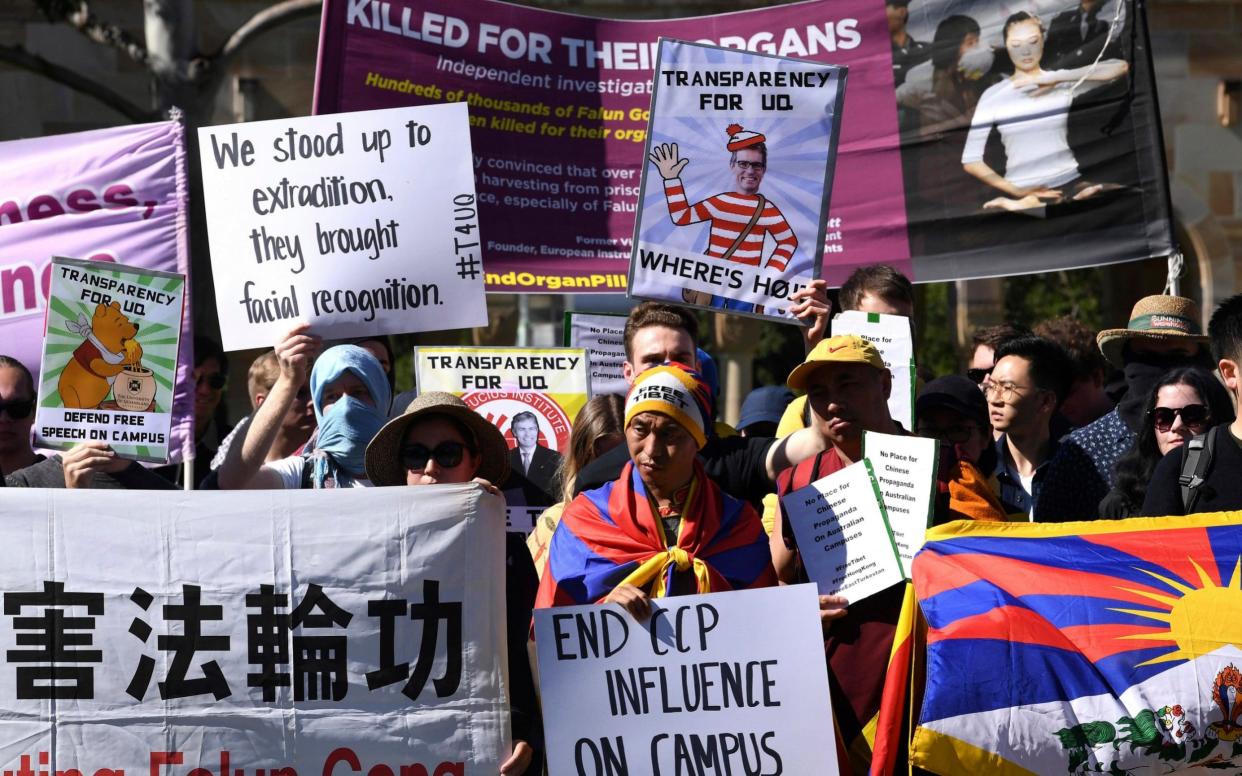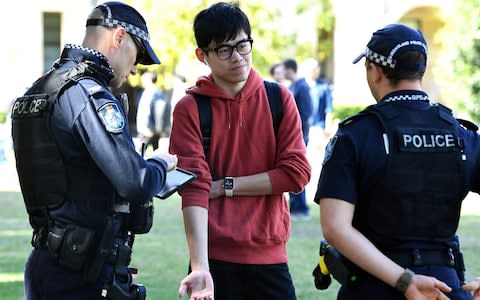Skirmishes over Hong Kong protests reflect growing Chinese influence on foreign university campuses

In one scene, hundreds of Chinese students forcefully disrupt a pro-Hong Kong democracy rally with a speaker blasting out their national anthem.
A young man disguised by a black facemask tears up a rally poster and throws it to the ground. Security guards hover nervously in between the two groups before inevitable violent skirmishes break out.
In another ugly confrontation, three young Chinese men round on a female student staging a small demonstration to support Hong Kong's current protests. They aggressively demand that she speak Mandarin and tell her to find another citizenship if she does not want to be Chinese.
"You are not human, you f**king stupid pig,” says one of incensed men. Moments later one brushes against her and she falls to the ground.
The clips from videos that went viral on social media this week were not filmed in Hong Kong, which has been shaken by eight weeks of pro-democracy rallies, but on the grounds of Australia’s University of Queensland and Auckland University in New Zealand.
Fears are growing that the altercations are a troubling portent of what is to come as the passions of Hong Kong citizens protesting Chinese rule spread to universities around the world.

Experts point out, however, that the Hong Kong issue is simply another flashpoint illustrating a growing display of assertive nationalism by Chinese students studying on foreign campuses.
Drew Pavlou, 20, a philosopher major and one of the organisers of the Queensland protest and who was seen shouting that Xi Jinping, the Chinese president, has “got to go” before his megaphone was snatched, said he has received numerous death threats.
The young man, a grandson of Greek immigrants from Brisbane, told The Telegraph he was now too nervous to go home. "I don't really know where I'm going to be living next week,” he said.
The Chinese consulates in Auckland and Brisbane praised their protesting students for “spontaneous patriotism”, drawing an unprecedented rebuke from Marise Payne, the Australian foreign minister, that diplomats should not interfere with free speech.
Auckland University has launched a “formal investigation.” Queensland stressed it would have “zero tolerance for violence and intimidation.”
The student clashes are a reminder of the dilemma facing universities of how to deal with a body of Chinese overseas students who bring not only a much-needed cash boost but also muscular nationalist demands that infringe on academic freedoms.
For Australia in particular, which has benefited from China’s economic growth and Chinese donations to its universities, more confrontations loom on the horizon.
However, British and other foreign institutions must also grapple with China's attempts to impose its views.

In some universities, links with the Confucius Institute, a state-backed organisation that promotes Chinese language and culture, have raised concerns about undue influence from Beijing.
Earlier this year, the London School of Economics faced protests from Chinese students to change a sculpture that showed Taiwan as separate from China. In 2017, Durham University was pressured to ban Anastasia Lin, a critic of the Chinese Communist party, from a campus debate.
Charles Parton, a senior associate fellow at the Royal United Services Institute, said the assertiveness of Chinese students was both a result of an early education in toeing the Communist party line and reflected state-led attempts to inject a Chinese worldview into foreign educational institutions.
Cash-strapped universities should be wary of giving China too much leverage, he said.
“There is a strategy to influence the way the UK generally thinks about [China] and, of course, our universities and think tanks are important opinion-moulders so they are more important in some ways,” Mr Parton added.
“This is where our future officials are brought up so if you can change the narrative about China generally, that’s got to be to your advantage.”

